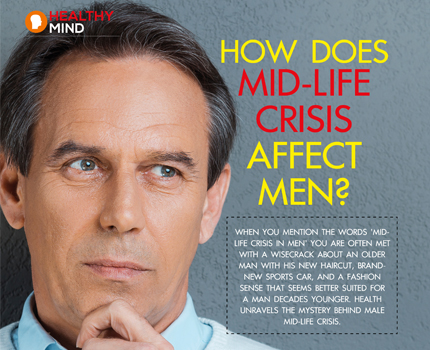 When you mention the words ‘midlife crisis in men’ you are often met with a wisecrack about an older man with his new haircut, brandnew sports car, and a fashion sense that seems better suited for a man decades younger. Health unravels the mystery behind male mid-life crisis.
When you mention the words ‘midlife crisis in men’ you are often met with a wisecrack about an older man with his new haircut, brandnew sports car, and a fashion sense that seems better suited for a man decades younger. Health unravels the mystery behind male mid-life crisis.
WHAT IT MEANS
Mid-life crisis can begin from around age 35 to even as late as age 60 and anytime in between. It is usually a mental condition that affects many males around the mid-point of their lives, especially when externally the man seems to have everything he wants materially. He may be at the peak of his career, have a seemingly good solid marriage with a spouse of many years, have children in their own lives and careers and perhaps some grandchildren. According to Dr. Raymond Hamden, Clinical and Forensic Psychologist, a central issue in the lives of many young adults is the anxiety and anticipation of a mid-life transition as they enter middle adulthood. “In his research of middle aged men, Daniel Levinson stated the idea that this transition in life for many men is a crisis,” he says, and specifically he argued that this crisis was a time of struggle and a feeling of being struck down by life.
THE PHYSICAL ASPECTS
In some men, it may also be a combination of physical problems, accompanying the mental, which is known as male menopause or andropause. As men begin to experience a drop in testosterone levels around age 30, for some it becomes significant enough that it gradually takes a physical and emotional toll. There’s a feeling of fatigue, depression, loss of concentration, decreased memory, loss of self-esteem and increased anxiety.
REGRET
Men often feel the need to reappraise previous life structures with an eye to making revisions while there is still time. “His perspective
internally may be he has devoted most of his adult life to fulfilling others rather than his own needs, having largely postponed living life as he has may have really wanted to,” says Dr. Hamden. “Before anything really dramatic happens, small nagging doubts may appear, perhaps followed by a series of dramatic, apparently irrational events leading up to a great change. During it men may ask themselves; is this all there is?”
WESTERN PHENOMENON
Interestingly enough, this phenomenon has been noted predominantly in the US and Europe and less in the East (including the UAE.) This may be a combination of many factors such as increased awareness about the disorder, media focus on it, education and information.
However, cultural socialization plays a huge role in the onset of the crisis as well. The idea that success is defined by what you do to make
money in life is predominantly a Western idea that is fast catching on to other parts of the world. Generally the root of the problem develops when self-esteem and self-worth are strongly linked to how much you have accomplished by a certain age. Dr. Hamden adds, “Often the man experiencing midlife crisis may be at the peak of his career and suddenly life may seem different with his own mortality facing him stronger than ever. He may think, ‘All I do is work and work and I am getting old. I want to be in a band or socialize with friends.’ Suddenly the myth that was taught to him since youth may shatter and he may begin to question the things that once meant the most to him; his career, his marriage, and his relationships with his family and friends.” All the things he may have cherished and worked really hard to achieve are now ‘choking him’ making him feel lost and insecure. Questioning one’s life may be disturbing, leading to major job changes or divorce; however the good news is Dr. Hamden indicates that mid-life crisis can also be a time for healthy changes that lead to a fulfilling middle age.
A MAN SUFFERING FROM MIDLIFE CRISIS MAY NOTICE THE FOLLOWING :
- His body may be taking longer to heal from illness and injuries.
- Begins to notice he does not have the physical stamina he once had.
- Has put on weight and may have developed a flabby muscle tone.
- Has begun to use reading glasses to read when he never had to before.
- Feels anxious about the future or anxious in general all the time.
- More irritable and emotional in general.
- Cannot make decisions as well as he used to.
- Having marital problems.
- Experiencing some panic attacks that life is closing in and ending soon.
- Feels many regrets.
- Not interested in the things that once interested him before.
- Unhappy with his life.
TIPS TO COPE WITH A MID-LIFE CRISIS
- Allow the person to talk openly and honestly about how he is feeling and why.
- Reinforce the idea that there is more to life than material gain or his job and status.
- Try to do fun things with him and allow him the space he needs, but do not let him feel isolated and alone, let him know you are there to be his partner and help and be his friend.
- Take up a sport or hobby together. Enjoy the time together and get physically fit at the same time.
- Be around good friends and family.
- Most importantly have lots of patience and tolerance for this time for his life for which he may feel no control.
- Suggest he make improvements with nutrition, stop smoking and get physically fit and active.
- Travel to a new country.
- Set new goals that are realistic and exciting.


